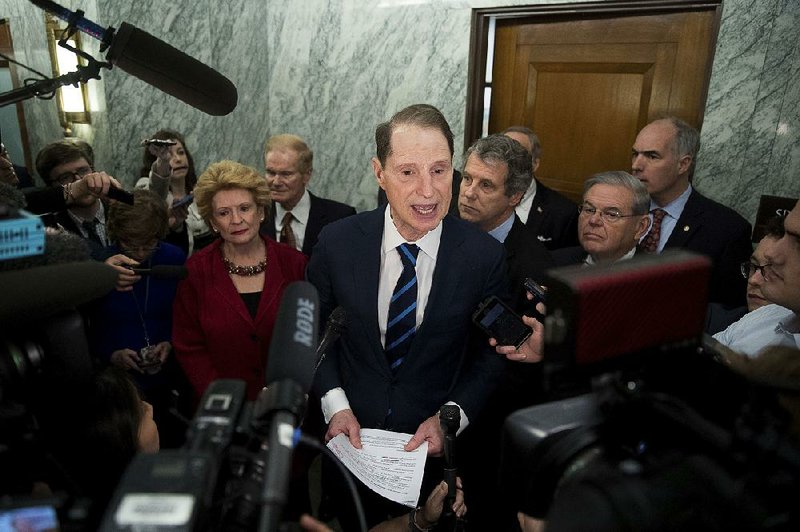WASHINGTON -- Democrats intensified their opposition to President Donald Trump on Tuesday by further delaying the confirmation of several of his Cabinet nominees amid strong Republican objections.
Hours after Trump fired acting Attorney General Sally Yates for refusing to defend his executive order banning certain travelers and refugees, Democrats blocked a committee from approving the president's choice for attorney general. With concerns about information provided by his picks to lead the Health and Human Services and the Treasury departments, Democrats did not show up at another Senate committee at all.
Democrats alone lack the votes needed to block any of Trump's nominees from eventually taking their posts, and there are no signs of Republican opposition to any of his picks.
During a hearing of the Senate Judiciary Committee, Democrats criticized Trump for firing Yates and said they would not support his nominee for attorney general, Sen. Jeff Sessions, R-Ala., because they do not believe he would ever stand up to Trump in a similar fashion. They also invoked an arcane rule to block the committee from holding a roll-call vote on Sessions' nomination Tuesday.
[PRESIDENT TRUMP: Details on administration, previous coverage, photos, videos]
After 4½ hours, panel Chairman Charles Grassley, R-Iowa, adjourned the session and set a new meeting today.
Just down the hallway of the Dirksen Senate Office Building, the Senate Finance Committee met to vote on Steven Mnuchin's nomination to serve as treasury secretary and Rep. Tom Price's nomination to be secretary of health and human services -- but Democrats boycotted the meeting, forcing Republicans to reschedule both votes.
Despite the push-back, Price, Mnuchin and Sessions remain on track to win eventual Senate confirmation, and other nominees made progress.
Although Democrats once again tried and failed to stall a vote to advance Trump's pick for education secretary, Betsy DeVos, to the full Senate, Republicans prevailed on a party-line vote.
Senators confirmed Elaine Chao to serve as Trump's transportation secretary by a vote of 93 to 6. Sens. John Boozman and Tom Cotton, both Arkansas Republicans, voted for her confirmation. Senate records show that no nominee for transportation secretary has earned so many no votes since at least Jimmy Carter's administration.
Chao, who was labor secretary under President George W. Bush and is the wife of Senate Majority Leader Mitch McConnell, R-Ky., was sworn in later Tuesday.
And the Senate Energy and Natural Resources Committee approved with bipartisan majorities the nominations of former Texas Gov. Rick Perry to be energy secretary and Rep. Ryan Zinke, R-Mont., to be interior secretary, sending them to the full Senate for final up-or-down votes.
Developments in the Judiciary and Finance committees, however, signaled how defiant Democrats remain in stalling Trump's nominees.
When the meeting began, Finance Committee Chairman Orrin Hatch, R-Utah, sat alone at the dais with just three other Republican senators. Having just come from the judiciary panel hearing, Hatch told his colleagues, "Jeff Sessions isn't treated much better than these fellas are."
"Some of this is just because they don't like the president," Hatch said, later adding that Democrats "ought to stop posturing and acting like idiots."
Sen. Mike Enzi, R-Wyo., agreed. "I think this is unconscionable," he said.
"We did not inflict this kind of obstructionism on President [Barack] Obama," added Sen. Patrick Toomey, R-Pa., the only other senator in the room. He added that the Democrats were committing "a completely unprecedented level of obstruction. This is not what the American people expect of the United States Senate."
Cotton accused Democrats on Tuesday of unreasonably obstructing Trump's nominees.
"They refused to show up to do their job," he said. "I don't know if they intend to abscond out of the [Washington] district, if we're going to have to vote to have the sergeant-at-arms track them down and haul them into work to do their business."
According to the Senate's website, the sergeant-at-arms "protects the senators and can arrest and detain any person violating Senate rules. Additionally, the SAA can compel senators to come to the Senate Chamber to establish a quorum."
"It is time to get over the fact that they lost the election," McConnell said. "The president is entitled to have his Cabinet appointments considered. None of this is going to lead to a different outcome."
Just four years ago, Republicans similarly boycotted a Senate committee's vote on Gina McCarthy to serve as Obama's interior secretary. Senators said at the time that she had refused to answer their questions about transparency in the agency.
Boycott
Shortly before the finance panel hearing began, committee Democrats huddled in the office of the panel's ranking member, Sen. Ron Wyden, D-Ore., and agreed that they would all boycott the session, aides said.
The boycott was prompted by Democrats' concerns that Mnuchin initially misstated his personal wealth on financial disclosure forms and misstated how OneWest Bank, a bank he led as chairman and chief executive officer, scrutinized mortgage documents.
The Columbus Dispatch reported that bank used "robo-signing" for hundreds of mortgage documents, a technique critics associate with fraud, though Mnuchin said it had not done so.
"He didn't tell the truth," Wyden said of reports that Price received preferential treatment in purchasing stock in a biotech company. "He misled the Congress and he misled the American people."
Democrats also said Trump's selection of Mnuchin breaks his campaign promise to go after Wall Street.
Republicans said they would try reconvening the Finance Committee today to see whether Democrats would cooperate. Hatch planned to discuss the standoff with Wyden.
Democrats also have raised questions about Price and his personal financial investments in health care companies and legislation he promoted that could have benefited several of the same companies. Some of the stock trades, as well as campaign donations from companies, closely coincided with one another.
A series of stock buys the lawmaker made in an Australian company, Innate Immunotherapeutics, has brought scrutiny for weeks. In 2016, he received a discounted price for his purchases as part of a private offering made to only a certain number of investors; the questions have been whether he received certain insider information from Rep. Chris Collins, R-N.Y., a company board member and its largest investor, and whether he got a special price when he bought $50,000 to $100,000 in shares last year.
The Wall Street Journal reported Monday that Price received a "privileged" offer that he had mischaracterized in the hearings when he said such offers "were available to every single individual that was an investor at the time."
Standing outside his office as the markup was to begin, Wyden told reporters that Price's statements contradicted those by Innate CEO Simon Wilkinson and other company officials.
"At a minimum," Wyden said, "I believe the committee should postpone this vote and talk to company officials."
Sen. Sherrod Brown, D-Ohio, said he was conferring with party colleagues until late Monday about how to proceed, and they ultimately decided to boycott.
"In some ways, we're doing President Trump a favor," Brown said. "If these nominees had been confirmed, and then these stories broke about how they lied, how they made money on foreclosures, how they made money off of sketchy health care stock trades, this would have been a major scandal for the administration. Now it's just a problem we can fix."
Sen. John Thune, R-S.D., said the Democratic boycott of Price would make it difficult for Republicans to enact crucial elements of their agenda like revamping the Patient Protection and Affordable Care Act.
"It gets a lot harder; we need him there," Thune said.
Yates defended
In the Judiciary Committee hearing, Sen. Dianne Feinstein, D-Calif., and other Democrats strongly defended Yates against Trump's claim that she had betrayed the Justice Department.
Yates, an Obama-era appointee, was fired Monday night for refusing to defend Trump's travel ban in federal court. In her place Trump installed Dana Boente, U.S. attorney for the Eastern District of Virginia, who is expected to have the job until Trump's pick is confirmed as attorney general.
Yates' defiance of Trump "took guts," Feinstein said. "That statement said what an independent attorney general should do. That statement took a steel spine to have the courage to say no."
"I have no confidence that Sen. Sessions will do that," she added. "Instead, he has been the fiercest, most dedicated and most loyal promoter in Congress of the Trump agenda."
Republicans defended Sessions but said little about Trump's executive order. Democrats ended the hearing by using the obscure "two-hour" rule that permits either party to stop committees from meeting beyond the first two hours of the Senate's official day. During the Obama administration, Republicans used the same rule against Democratic Cabinet nominees.
Meanwhile, Health, Education Labor and Pensions Committee Democrats tried postponing the vote on DeVos, complaining she had just submitted written responses to hundreds of questions on Monday night and plagiarized some answers.
The panel then toiled over the actual vote on DeVos' nomination, with Democrats complaining that it shouldn't count because Hatch -- a member of the committee who was simultaneously dealing with events in the Judiciary and Finance meetings -- was allowed to submit a proxy vote. Without him in the room, the 23-member committee would have deadlocked. After a recess and several minutes of heated argument, Republicans ordered a revote with Hatch in the room and approved DeVos along party lines, 12 to 11.
Information for this article was contributed by Ed O'Keefe, Sean Sullivan, Kelsey Snell, Amy Goldstein, Kimberly Kindy and David Weigel of The Washington Post; by Alan Fram, Maria Danilova, Mary Clare Jalonick and Martin Crutsinger of The Associated Press; and by Frank E. Lockwood of the Arkansas Democrat-Gazette.
A Section on 02/01/2017


